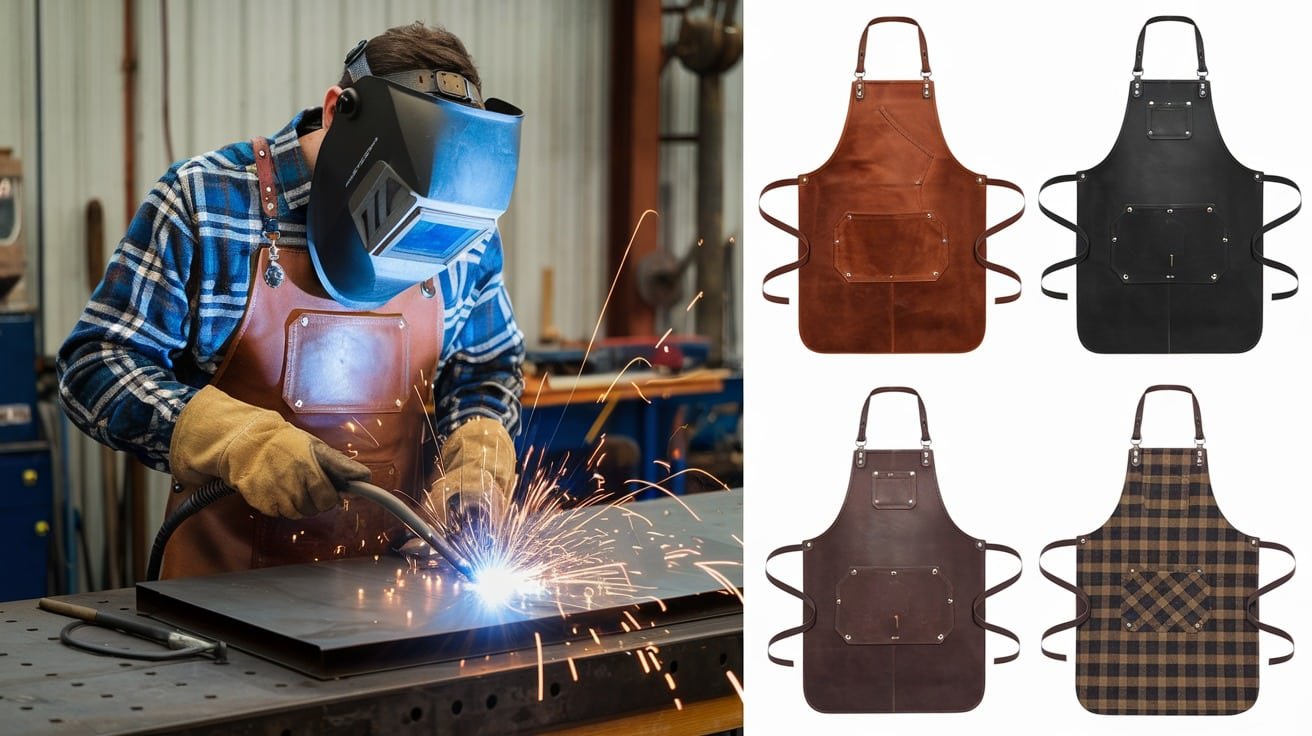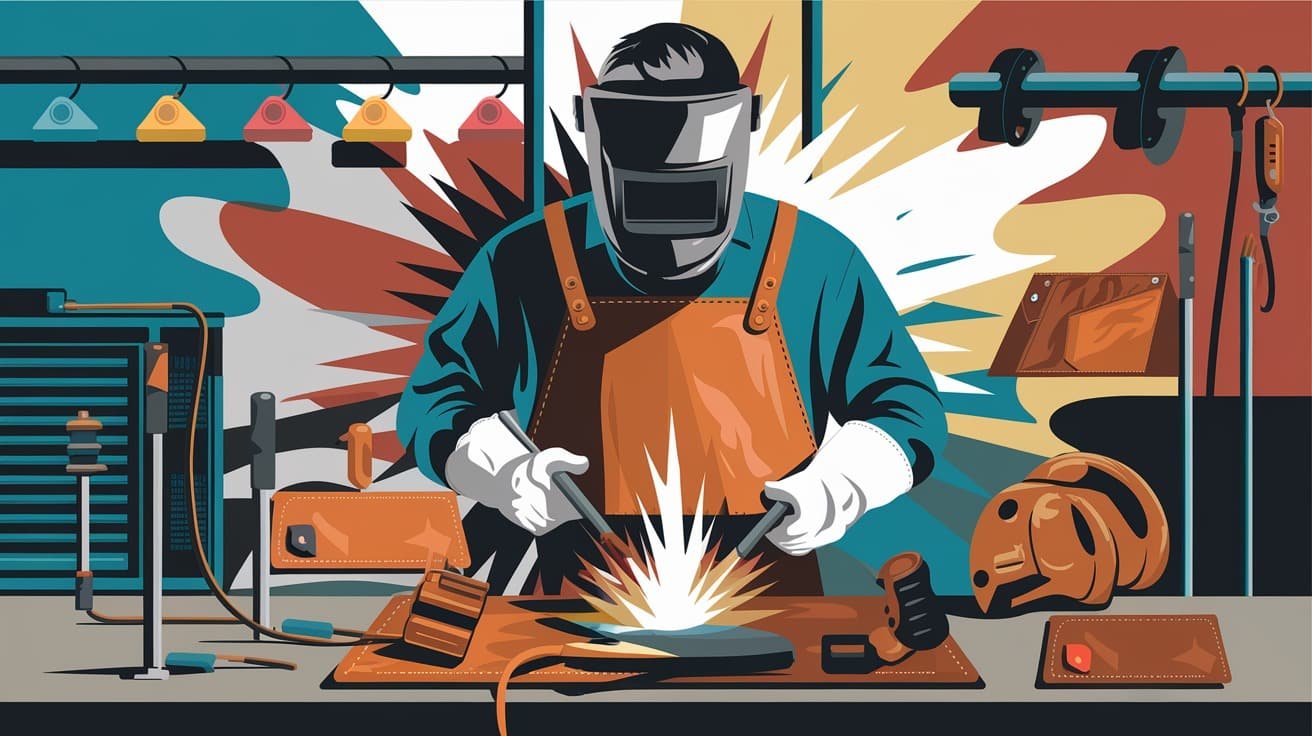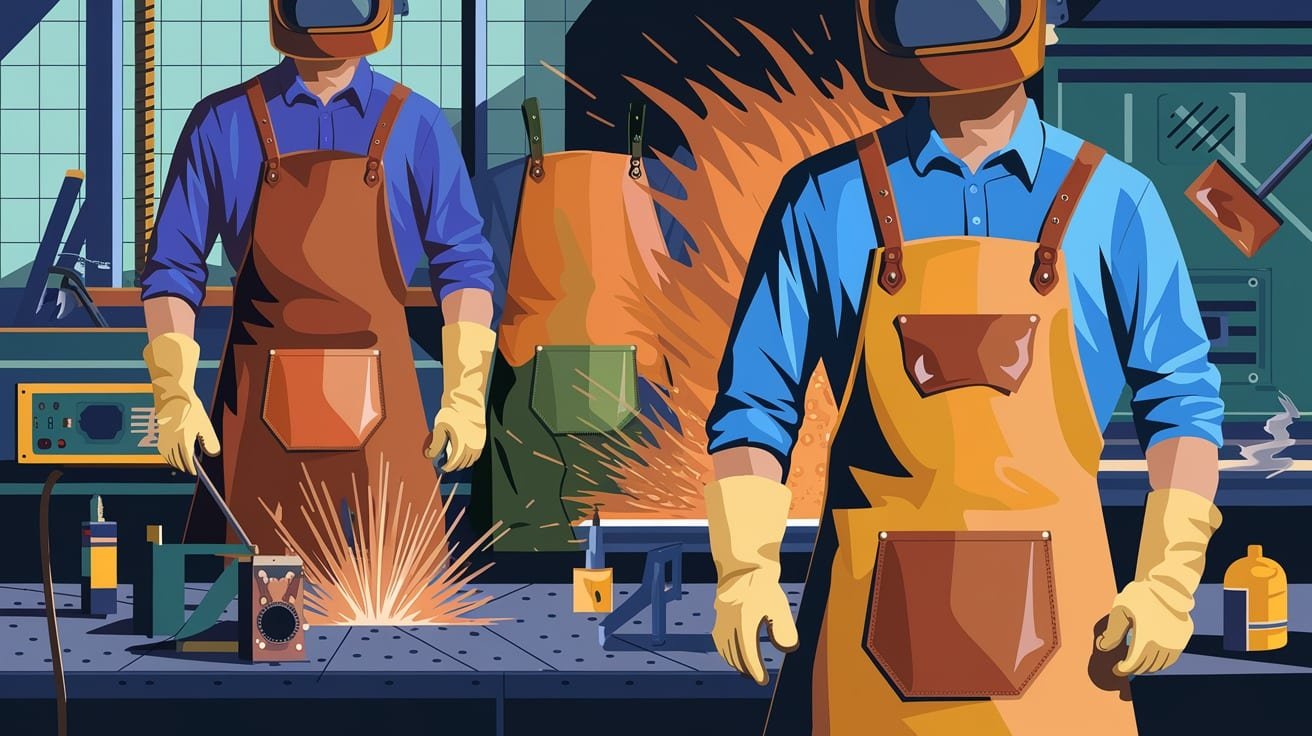20-Inch Buffalo Leather Travel Duffle Bag
Rated 4.33 out of 5
(3)
AC Special Edition Crazy Horse Leather Apron
Rated 4.50 out of 5
(14)
Select options
This product has multiple variants. The options may be chosen on the product page
SAVE BIG!!! Use Coupon Code 10PERCENT at Checkout to Enjoy 10% off on your Order!
Free Shipping Worldwide. support@aproncrafts.com

Therefore, leather is preferred for manufacturing welding aprons because it provides unique characteristic desirable in a welding environment. Leather on the other hand is heat resistant and will not melt or burn like synthetics; it provides protection to welders particularly against high heat and likely hood of burning themselves. It is also considerably strong – the dense crystalline structure of the material also renders. It highly resilient to cuts and impact, and shield against the dangers of spatter, flying sparks and molten metal.
Leather is incredibly durable, so aprons made from it last a long time, regardless of the environment. This makes leather not only a wise investment in the user's safety but also in the apron’s longevity. This makes leather aprons to have a formidable protection barrier. Which is very important since they serve as protective clothing for a long time.
Welding aprons use several varieties of leather, each with qualities suited to different operations and levels of safety.
Cowhide is the most widely used in welding leather aprons due to its thickness, toughness, heat resistance, and abrasion resistance. It doesn't easily melt or burn, providing excellent protection against heat. Sparks and molten metal all of which are essential for welders. Experts highly recommend cowhide for vocational activities like welding and similar jobs.
Cowhide aprons for example are very popular as it is very hardwearing. Thus would be very durable to the onslaughts of continuous use. Also, they are cheaper, more accessible than other leathers There is also easy availability of this material in the market. Certain other types of cowhide aprons come with flame-resistant finishes which increases their heat resistance and product life span.
Ventilated leather, which comes from the lower layers of the hide, is softer and more flexible. Than full aniline leather, but not as strong as full-grain leather. Manufacturers extensively use it in heavy-duty welding aprons where cushioning for the skin is as important as protection against sparks. Split leather seems to be more flexible than other leather keeping welders in a comfortable position as they work. Yet it is highly resistant to heat and sparks.
This makes it a cost effective material, more so to welders need strong aprons for protection. But at a cheaper price as compared to the whole leather material. Split leather is not as hard as cowhide while aprons made from this material are thicker and slightly heavier; all this is suitable for tough jobs. This type of leather is also considerably more durable than other types of leather and also does not wear abrasively.

Goatskin leather has a lot of uses in modern world products for its lightness and its ability to bend. It is not as thick as cowhide but equally as good when it comes to offering a measure of comfort and protection leather apron. Goatskin is very soft and therefore allows free movement; You can use it for welding work that doesn't involve heavy activity or for welding jobs that require long working hours.
Apart from high tensile strength, the material property of goat skin particularly proved to be very tough and flexible to allow it to undergo the precise cutting operations. Goat skin aprons are lighter in weight and more comfortable to wear around delicate areas and tight spaces more than the heavy cotton welder aprons for more dexterity. It’s effectively used in welding gloves too and in aprons where less welding is involved.
Deerskin is very smooth, supple, and does not cause any kinds of irritation when used as clothing material. Although it may not have the same ruggedness being a cowhide or split leather, it is suitable for welders who perform lighter job activities and require comfort in these tasks. Deerskin leather is relatively smooth, thus it proves comfortable to wear for a long time, particularly for more precise or lesser demanding welding.
The lightweight nature of deerskin leather means it won’t weigh the welder down, and its flexibility provides ease of movement. Since deerskin is not as tough as other leathers, it suits less intense welding applications or workers who need more flexibility and comfort.
While the type of leather is crucial, you should also consider other factors when selecting a welding apron to ensure the best protection and comfort:
Leather welding aprons offer several advantages that make them the preferred choice for professionals:

To ensure your leather welding apron remains effective and lasts as long as possible, proper care is essential:
Welding aprons are very important to shield welders from heat source, sparks and hot metal. Leather stands out as the most efficient material for withstanding high temperatures, enduring heavy stress, and performing effectively in harsh conditions. Cowhide or split leather provides greatest durability while goatskin and deerskin provide additional comfort for pursuits that are not very strenuous. By selecting the right type of leather apron and properly caring for it, welders can protect themselves and ensure their gear remains effective.
No account yet?
Create an Account